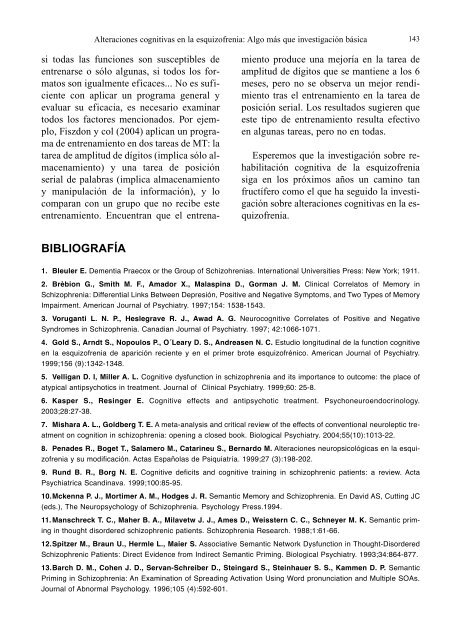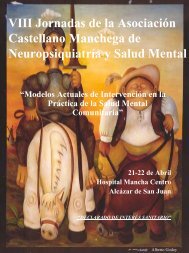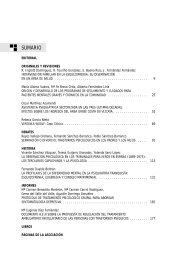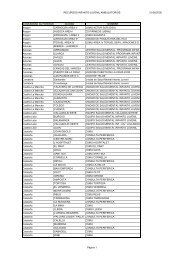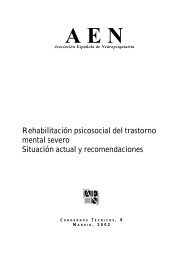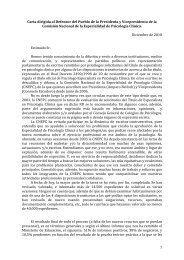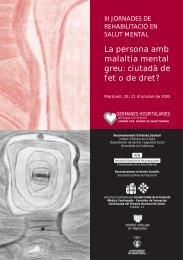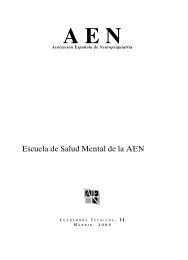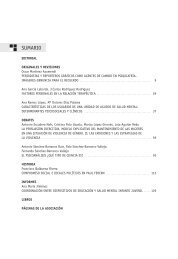Vol 4. Nº 2. 2004 - Asociación Española de Neuropsiquiatría
Vol 4. Nº 2. 2004 - Asociación Española de Neuropsiquiatría
Vol 4. Nº 2. 2004 - Asociación Española de Neuropsiquiatría
Create successful ePaper yourself
Turn your PDF publications into a flip-book with our unique Google optimized e-Paper software.
Alteraciones cognitivas en la esquizofrenia: Algo más que investigación básica143si todas las funciones son susceptibles <strong>de</strong>entrenarse o sólo algunas, si todos los formatosson igualmente eficaces... No es suficientecon aplicar un programa general yevaluar su eficacia, es necesario examinartodos los factores mencionados. Por ejemplo,Fiszdon y col (<strong>2004</strong>) aplican un programa<strong>de</strong> entrenamiento en dos tareas <strong>de</strong> MT: latarea <strong>de</strong> amplitud <strong>de</strong> dígitos (implica sólo almacenamiento)y una tarea <strong>de</strong> posiciónserial <strong>de</strong> palabras (implica almacenamientoy manipulación <strong>de</strong> la información), y locomparan con un grupo que no recibe esteentrenamiento. Encuentran que el entrenamientoproduce una mejoría en la tarea <strong>de</strong>amplitud <strong>de</strong> dígitos que se mantiene a los 6meses, pero no se observa un mejor rendimientotras el entrenamiento en la tarea <strong>de</strong>posición serial. Los resultados sugieren queeste tipo <strong>de</strong> entrenamiento resulta efectivoen algunas tareas, pero no en todas.Esperemos que la investigación sobre rehabilitacióncognitiva <strong>de</strong> la esquizofreniasiga en los próximos años un camino tanfructífero como el que ha seguido la investigaciónsobre alteraciones cognitivas en la esquizofrenia.BIBLIOGRAFÍA1. Bleuler E. Dementia Praecox or the Group of Schizohrenias. International Universities Press: New York; 1911.<strong>2.</strong> Brèbion G., Smith M. F., Amador X., Malaspina D., Gorman J. M. Clinical Correlatos of Memory inSchizophrenia: Differential Links Between Depresión, Positive and Negative Symptoms, and Two Types of MemoryImpairment. American Journal of Psychiatry. 1997;154: 1538-1543.3. Voruganti L. N. P., Heslegrave R. J., Awad A. G. Neurocognitive Correlates of Positive and NegativeSyndromes in Schizophrenia. Canadian Journal of Psychiatry. 1997; 42:1066-1071.<strong>4.</strong> Gold S., Arndt S., Nopoulos P., O´Leary D. S., Andreasen N. C. Estudio longitudinal <strong>de</strong> la function cognitiveen la esquizofrenia <strong>de</strong> aparición reciente y en el primer brote esquizofrénico. American Journal of Psychiatry.1999;156 (9):1342-1348.5. Velligan D. I, Miller A. L. Cognitive dysfunction in schizophrenia and its importance to outcome: the place ofatypical antipsychotics in treatment. Journal of Clinical Psychiatry. 1999;60: 25-8.6. Kasper S., Resinger E. Cognitive effects and antipsychotic treatment. Psychoneuroendocrinology.2003;28:27-38.7. Mishara A. L., Goldberg T. E. A meta-analysis and critical review of the effects of conventional neuroleptic treatmenton cognition in schizophrenia: opening a closed book. Biological Psychiatry. <strong>2004</strong>;55(10):1013-2<strong>2.</strong>8. Pena<strong>de</strong>s R., Boget T., Salamero M., Catarineu S., Bernardo M. Alteraciones neuropsicológicas en la esquizofreniay su modificación. Actas <strong>Española</strong>s <strong>de</strong> Psiquiatría. 1999;27 (3):198-20<strong>2.</strong>9. Rund B. R., Borg N. E. Cognitive <strong>de</strong>ficits and cognitive training in schizophrenic patients: a review. ActaPsychiatrica Scandinava. 1999;100:85-95.10.Mckenna P. J., Mortimer A. M., Hodges J. R. Semantic Memory and Schizophrenia. En David AS, Cutting JC(eds.), The Neuropsychology of Schizophrenia. Psychology Press.199<strong>4.</strong>11.Manschreck T. C., Maher B. A., Milavetw J. J., Ames D., Weisstern C. C., Schneyer M. K. Semantic primingin thought disor<strong>de</strong>red schizophrenic patients. Schizophrenia Research. 1988;1:61-66.1<strong>2.</strong>Spitzer M., Braun U., Hermle L., Maier S. Associative Semantic Network Dysfunction in Thought-Disor<strong>de</strong>redSchizophrenic Patients: Direct Evi<strong>de</strong>nce from Indirect Semantic Priming. Biological Psychiatry. 1993;34:864-877.13.Barch D. M., Cohen J. D., Servan-Schreiber D., Steingard S., Steinhauer S. S., Kammen D. P. SemanticPriming in Schizophrenia: An Examination of Spreading Activation Using Word pronunciation and Multiple SOAs.Journal of Abnormal Psychology. 1996;105 (4):592-601.


